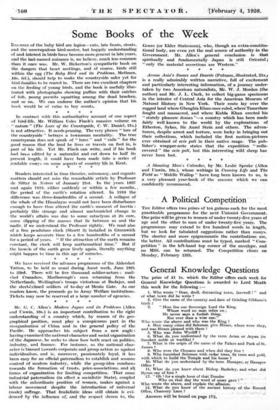Mr. G. C, Allen's Modern Japan and its Problems (Allen
and Unwin, 10s.) is an important contribution to the right understanding of a country which, by reason of its geo- graphical position, must play a conspicuous part in the reorganization of China and in the general policy of the Pacific. He approaches his subject from a new angle : having examined the national character and social organization of the Japanese, he seeks to show how both react on politics, industry, and finance. For instance, as the national char- acter is biassed towards corporate and group action as against individualism, and is, moreover, passionately loyal, it has been easy for an official paternalism to establish and assume control of modem industry, while the group-idea conduces towards the formation of trusts, price-associations, and all forms of organization for limiting competition. That same industrial paternalism (in effect a socialistic State), coupled with the subordinate position of women, makes against a labour movement despite the introduction of universal (male) suffrage. That feudalistic ideas still obtain is evi- denced by the influence of, and the respect shown to, the Genro (or Elder Statesmen), who, though an extra-constitu- tional body, are even yet the real source of authority-in the Government. Mr. Allen's general conclusion is that spiritually and fundamentally Japan is still Oriental ; " only the material accretions are Western."
* * * *






































 Previous page
Previous page